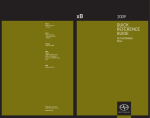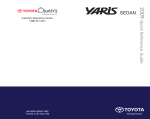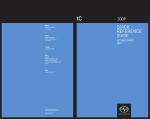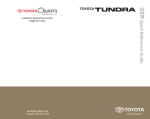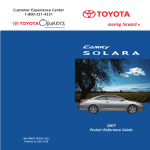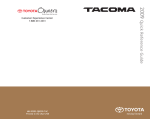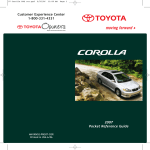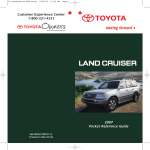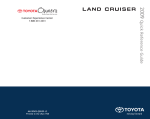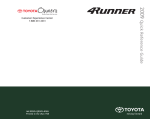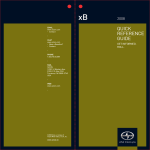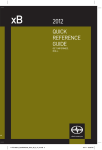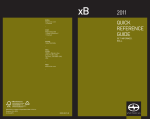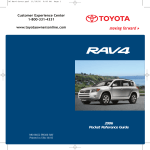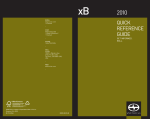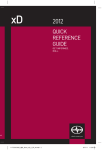Download Toyota 00505-QRG09-COR User's Manual
Transcript
Customer Experience Center 1-800-331-4331 2009 Quick Reference Guide MN 00505-QRG09-COR Printed in the USA 12/07 Interactive Owner’s Guide Spare tire & tools Tool location OVERVIEW Have a question about the main features of your new Toyota? Find the answers quickly and easily in this Quick Reference Guide, which includes highlights from the Owner’s Manual. For more detailed information, and helpful interactive demonstrations and tips, visit www.Toyotaiguide.com. This user-friendly website makes learning all about your new vehicle fun and easy. Tool box Removing the spare tire Spare tire www.ToyotaiGuide.com (3) (1) Remove the luggage floor cover. (2) Remove the tool tray. (3) Loosen the center fastener that secures the spare tire. Refer to the Owner’s Manual for tire changing and jack positioning procedures. 21 SAFETY AND EMERGENCY FEATURES This iGuide is not intended as a substitute for the Owner’s Manual located in the vehicle’s glove box. We strongly encourage you to review the Owner’s Manual and supplementary manuals so you will have a better understanding of the vehicle’s capabilities and limitations. Important Cautions, to help you avoid injuries, and Notices, to help you avoid equipment damage or malfunction, can also be found in the Owner’s Manual. (2) FEATURES/OPERATIONS (1) Jack 2009 Corolla Quick Reference Guide OVERVIEW EMERGENCY FEATURES 2 16 17 10 10 19 20 19 19 21 20 20 Visit your Toyota dealer for information on customizing this feature. Programmable by customer. Refer to the Owner’s Manual for instructions and more information. 1 SAFETY AND EMERGENCY FEATURES 1 Child comfort guide Doors-Child safety locks Seat belts Seat belts-Shoulder belt adjustment Spare tire & tools Tire Pressure Warning System Trunk-Internal release 14 12-13 9 8 18 16 15 18 17 18 11 17 15 8 14 9 9 10 FEATURES/OPERATIONS SAFETY AND Air Conditioning/Heating Audio Auto lock functions2 Automatic Transmission Auxiliary storage Clock Cruise control Cup holders Door locks-Power Light control-Instrument panel Lights & turn signals Moonroof Multi-information display Parking brake Power outlets Seat adjustments-Front Seat adjustments-Rear Seats-Head restraints Telephone controls (Bluetooth®) Tilt and telescopic steering wheel Windows-Power Windshield wipers & washers 7 6 7 5 4 2-3 6 OVERVIEW FEATURES/OPERATIONS Engine maintenance Fuel tank door release and cap Hood release Indicator symbols Instrument cluster Instrument panel Keyless entry1 OVERVIEW Instrument panel OVERVIEW Steering wheel controls Air Conditioning system FEATURES/OPERATIONS 2 Front passenger seat belt reminder light “AIR BAG ON” and “AIR BAG OFF” indicator Engine immobilizer indicator AUX adapter Tire Pressure Warning System reset Tilt and telescopic steering control Hood lock release lever 1 2 If equipped Vehicles with navigation system: for details, refer to the “Navigation System Owner’s Manual.” 3 SAFETY AND EMERGENCY FEATURES Steering wheel audio controls1,2 Voice command button1 Telephone controls1 Engine switch (mechanical key)1 Cruise control1 VSC/TRAC OFF switch1 Power rearview mirror control Auxiliary storage Headlight, turn signal and front fog light1 controls Wiper and washer controls Emergency flasher button Audio system2 Air Conditioning controls Outside rearview mirror1/Rear window defogger button OVERVIEW Instrument cluster Indicator symbols Optitron type meters Brake system warning1 Driver seat belt reminder (alarm will sound if speed is over 12 mph) Front passenger seat belt reminder (alarm will sound if speed is over 12 mph) OVERVIEW For details, refer to “Indicators and warning lights,” Section 2-2, 2009 Owner’s Manual. Charging system warning1 “AIR BAG ON” and “AIR BAG OFF” indicator1 Electric power steering warning1 Malfunction/Check Engine indicator1 Low fuel level warning Non-optitron type meters SRS Airbag warning1 Low Tire Pressure Warning1 Headlight low/high beam indicator FEATURES/OPERATIONS Open door warning Turn signal indicator Fog light indicator Slip indicator1 4 Anti-lock Brake System warning1 “VSC OFF” indicator1 Low engine oil pressure warning1 Engine oil replacement reminder1 1 If indicator does not turn off within a few seconds of starting engine, there may be a malfunction. Have vehicle inspected by your Toyota dealer. 5 SAFETY AND EMERGENCY FEATURES Service indicator and reminder Tachometer Speedometer Fuel gauge Trip meter reset/Instrument panel light control Odometer and two trip meters Automatic Transmission shift range display (if equipped) Multi-information display Display button Engine coolant temperature Cruise control indicator OVERVIEW Keyless entry (if equipped) Locking operation Unlocking operation Hood release OVERVIEW Push ONCE: Driver door TWICE: All doors Trunk lid operation NOTE: If a door is not opened within 60 seconds of unlocking, all doors will relock for safety. Push Panic button Fuel tank door release and cap Engine maintenance 4 cylinder (2AZ-FE) engine Pull up latch and raise hood 4 cylinder (2ZR-FE) engine FEATURES/OPERATIONS Push and hold Pull Push and hold Turn Pull Engine coolant reservoir Engine oil filler cap Engine oil level dipstick Windshield washer fluid tank NOTE: Tighten until one click is heard. If the cap is not tightened enough, Check Engine “ ” indicator may illuminate. 6 7 SAFETY AND EMERGENCY FEATURES Store Note: Regularly scheduled maintenance, including oil changes, will help extend the life of your vehicle and maintain performance. Please refer to the “Owner’s Warranty Information Booklet,” “Scheduled Maintenance Guide” or “Owner’s Manual Supplement.” FEATURES/OPERATIONS Automatic Transmission (if equipped) Standard type Reverse Automatic door locks can be programmed to operate in two different modes, or turned OFF. -Doors lock when shifting from “Park.” -Doors lock when the vehicle speed is approximately 12 mph or higher. -Doors unlock when shifting into “Park.” -Doors unlock when the driver’s door is opened within 10 seconds after setting the engine switch or “ENGINE START STOP” switch OFF. Park* Neutral Reverse Drive Neutral Third gear Refer to the Owner’s Manual for more details. Drive Second gear “S” mode First gear OVERVIEW Park* 3 2 L Auto lock functions (if equipped) Multi-mode type “S” “D” * The ignition switch must be ON, and the brake pedal depressed to shift from “Park.” Seat adjustments-Front Manual seat “S” (Sequential) mode Shift the shift lever to “S” position from “D” position. Downshifting increases power going uphill, or provides engine braking downhill. For best fuel economy during normal driving conditions, always drive with the shift lever in the “D” position. Parking brake Set Release (2) Push (1) Pull slightly Pull Position Height crank (driver side only) Seatback angle Seat adjustments-Rear Pull Fold down 8 9 SAFETY AND EMERGENCY FEATURES (3) Lower FEATURES/OPERATIONS Floor shift type: +: Upshift (push and release) -: Downshift (pull and release) FEATURES/OPERATIONS Seats-Head restraints Lights & turn signals Headlights Rear Front OVERVIEW Headlights Parking lights Lock release button Windshield wipers & washers Adjust interval* Single wipe Lock release button High beam Low beam Pull to wash and wipe Fast * Intermittent windshield wiper interval adjustment Rotate up to decrease interval, down to increase interval (if equipped). Windows-Power (if equipped) Driver side Daytime Running Light system (DRL) Headlights turn on automatically upon starting engine. The brightness of the headlights will automatically change depending on the darkness of the surroundings. Front fog lights (if equipped) Window lock switch Up FEATURES/OPERATIONS Interval wipe Slow High beam flasher Turn Front fog lights come on only when the headlights are on low beam. Turn signals Right turn SAFETY AND EMERGENCY FEATURES Down Lane change Automatic operation (driver side only) Push the switch completely down and release to fully open. To stop window midway, lightly push the switch in the opposite direction. Window lock switch Deactivates all passenger windows. Driver’s window remains operable. 10 Lane change Left turn 11 FEATURES/OPERATIONS Audio RADIO Eject CD Push to turn ON/OFF Preset buttons - functions in other modes indicated above number Seek station/ CD track select Push and turn to adjust tone & balance To preset stations Tune in the desired station and hold down a preset button (1-6) until you hear a beep. Push desired preset button (1-6) to select. To scan stations Push and hold “SCAN” to scan preset stations. Push again to hold selection. AUX audio jack By inserting a mini plug into the AUX audio jack, you can listen to music from a portable audio device through the vehicle’s speaker system. Push to skip up/down folder and radio category type Station/CD track scan View CD text Mode Steering wheel switches (if equipped) Volume control Load CD(s) FEATURES/OPERATIONS Type 2 other functions OVERVIEW Type 1 functions v 12 13 SAFETY AND EMERGENCY FEATURES CD PLAYER To scan tracks on a disc Push and hold “SCAN.” Push again to hold selection. CD changer (Type 2) -To load one disc Push “LOAD” and insert one disc. -To load multiple discs Push and hold “LOAD” until you hear a beep. Insert one disc. Shutter will close and then re-open for next disc. To select a file (MP3/WMA only) Turn “TUNE.FILE.” “v ” -In radio mode Push to select a preset station; push and hold to seek the next strong station. -In CD mode Push to skip up or down to next/previous track. “MODE” Push to turn audio ON and to select an audio mode. Push and hold to turn the audio system “OFF.” FEATURES/OPERATIONS Air Conditioning/Heating Cruise control (if equipped) Turning system ON/OFF OVERVIEW System ON/OFF Power outlets Center console Front console (if equipped) 14 1 2 Increase speed Resume2 Cancel1 Decrease speed The set speed may also be cancelled by depressing the brake pedal. The set speed may be resumed once vehicle speed exceeds 25 mph. Multi-information display Display button Push the display button to change information in the following: (1) Clock (2) Outside temperature (3) Current gas mileage (4) Average gas mileage* (5) Miles left on remaining fuel (6) Average vehicle speed from engine start* (7) Running time from engine start* * Push and hold display button to reset. 15 SAFETY AND EMERGENCY FEATURES Designed for 12V car accessories. The engine switch must be in the “ACC” or “ON” position. Functions FEATURES/OPERATIONS Airflow vent In “ ” or “ ” mode, use fresh air (“ ” indicator “OFF”) to reduce window fogging. Fan speed Temperature Air Conditioning ON/OFF Use for quick cooling. MAX A/C changes air intake to recirculate. It is not possible to change intake to fresh, or to turn A/C OFF in this mode. Outside rearview mirror/Rear window defogger Fresh or recirculated cabin air FEATURES/OPERATIONS Telephone controls (Bluetooth®) (if equipped) Vehicles without moonroof Recommended driving position to minimize wind noise. Tilting operation OVERVIEW Vehicles with moonroof Moonroof (if equipped) Sliding operation Open Steering wheel telephone switches Start call End call Volume control Close Close Tilt Tilt and telescopic steering wheel Length Voice command button Bluetooth® technology allows you to place or receive calls without taking your hands from the steering wheel or using a cable to connect the compatible telephone and the system. Refer to the Owner’s Manual for more details. Clock FEATURES/OPERATIONS Angle Hold wheel, push lever down, set angle and length, then return lever. Lock release lever Note: Do not attempt to adjust while the vehicle is in motion. Door locks-Power(if equipped) (1) Push and hold the display button to set the clock. (2) While flashing, press button repeatedly to adjust minutes. (3) Wait five seconds to adjust the hour. (4) Wait another five seconds for process to complete. 16 SAFETY AND EMERGENCY FEATURES Unlock Lock 17 SAFETY AND EMERGENCY FEATURES FEATURES/OPERATIONS Light control-Instrument panel - + Take up slack Too high OVERVIEW Brightness control Seat belts Keep as low on hips as possible If belt is fully extended, then retracted even slightly, it cannot be re-extended beyond that point, unless fully retracted again. This feature is used to help hold child restraint systems securely. Cup holders Front To find more information about seat belts, and how to install a child restraint system, refer to the Owner's Manual. Rear Seat belts-Shoulder belt adjustment Auxiliary storage Instrument panel Type A FEATURES/OPERATIONS Push up, or squeeze lock release to lower Type C Type B Pull Pull Child comfort guide Overhead console Push 18 19 SAFETY AND EMERGENCY FEATURES Rear seat outside position guides provide added comfort for children who have outgrown child restraints. Pull Tire Pressure Warning System System reset initialization 1. Push and hold “ SET” button until the indicator blinks three times. 2. Wait a few minutes to allow initialization to complete. If tire pressure becomes critically low on any of the tires, indicator comes on. Pushing “ SET” button should not turn off the light. Correctly adjusting tire inflation will turn off the light after a few minutes. After replacing/rotating tire or wheels, the system must be initialized. Refer to the Owner’s Manual for more details. Trunk-Internal release Pull up Doors-Child safety locks Rear door Moving the lever to “LOCK” will allow the door to be opened only from the outside. 20 Interactive Owner’s Guide Spare tire & tools Tool location OVERVIEW Have a question about the main features of your new Toyota? Find the answers quickly and easily in this Quick Reference Guide, which includes highlights from the Owner’s Manual. For more detailed information, and helpful interactive demonstrations and tips, visit www.Toyotaiguide.com. This user-friendly website makes learning all about your new vehicle fun and easy. Tool box Removing the spare tire Spare tire www.ToyotaiGuide.com (3) (1) Remove the luggage floor cover. (2) Remove the tool tray. (3) Loosen the center fastener that secures the spare tire. Refer to the Owner’s Manual for tire changing and jack positioning procedures. 21 SAFETY AND EMERGENCY FEATURES This iGuide is not intended as a substitute for the Owner’s Manual located in the vehicle’s glove box. We strongly encourage you to review the Owner’s Manual and supplementary manuals so you will have a better understanding of the vehicle’s capabilities and limitations. Important Cautions, to help you avoid injuries, and Notices, to help you avoid equipment damage or malfunction, can also be found in the Owner’s Manual. (2) FEATURES/OPERATIONS (1) Jack















